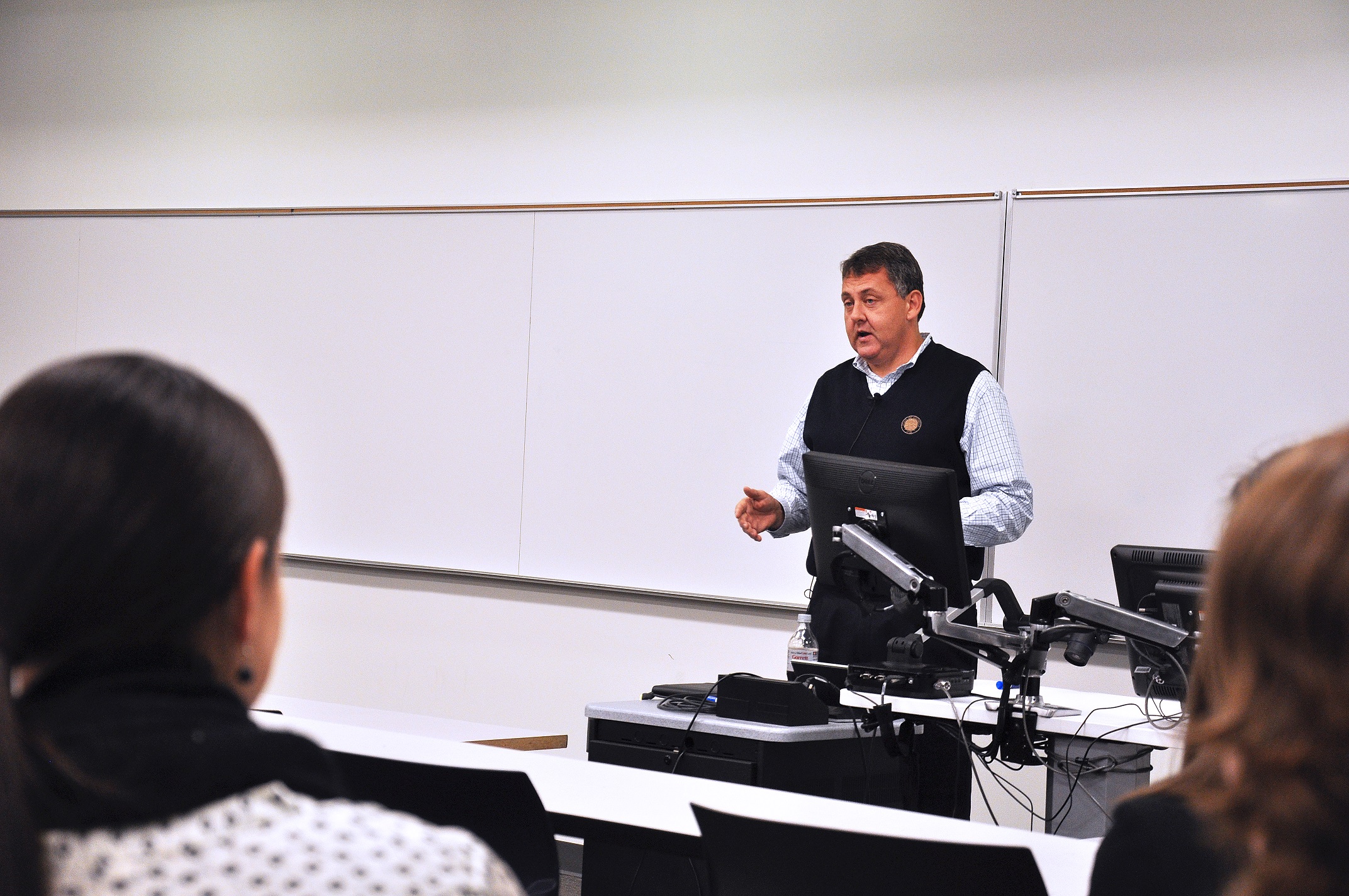Ga. senator outlines state's transportation funding challenges, possible solutions
State Sen. Steve Gooch says Georgia’s facing a billion-dollar transportation problem in the coming years.
He would know: Gooch (R-Dahlonega) is one of the co-chairmen of the Georgia General Assembly’s Joint Study Committee on Critical Transportation Infrastructure Funding. Speaking to a group in the School of Civil and Environmental Engineering Nov. 13, Gooch said the state relies too heavily on federal dollars to pay for transportation needs, so his committee is considering its options.
“Currently, we get about $1.2 billion a year from the federal government for transportation. We spend about a billion dollars of our own money here in Georgia on transportation,” he said at the seminar organized by the National Center for Transportation Systems Productivity and Management. “We’ve got to wean ourselves away from that, and that’s going to be a challenge for us. We don’t know what the future holds for federal funding.”
The study committee, also led by state Rep. Jay Roberts (R-Ocilla), has been touring the state since this summer, listening to residents ahead of the 2015 General Assembly that begins in January. Gooch said they’re trying to find a way to generate an extra $1 billion in revenue dedicated to state transportation needs.
“We’re going to look at all of these options,” Gooch said. “There’s no silver bullet here; we’re not going to say, ‘OK, the answer is just to raise the gas tax to 80 cents a gallon,’ because we don’t think, politically, we [could do] that. So we may have a combination of four or five of these methods.”
Those strategies could include:
- Changing how the gasoline tax is structured. Revenues are down because newer vehicles are more fuel-efficient and drivers buy less gas. Gooch said lawmakers could consider changing the gas tax from a 7.5 percent state excise tax to a flat amount or could switch to a fee based on how far drivers travel rather than how much gas they buy. (Oregon is among the states experimenting with such a system.)
- Charging an extra registration fee for alternative-fuel vehicles, perhaps $100 a year, that would account for the wear and tear on infrastructure from such vehicles and recapture the money drivers aren’t paying through the gas tax.
- Increasing the state sales tax by 1 percent and rolling back the state income tax by half a percent, a move that Gooch said could generate $700 million. That could be coupled with directing all four cents of the current state sales tax on gasoline to the Georgia Department of Transportation. Currently, three cents goes to GDOT and the fourth penny goes to the state’s general fund to pay for other things. Gooch said budget officials estimate that would account for another $200 million, which gets close to the total $1 billion in extra funding lawmakers are looking for.
“The problem is, do we have the votes to pass something like that in the state? It’s not a definite thing,” Gooch said. “We’re going to have to work hard, and we’re going to have to look at, what does it take to get [lawmakers] convinced that this is the year we need to do something?
“This isn’t something we want to do every year, we don’t want to keep talking about funding every year. We want to do something now that’s going to work for the next 20 or 30 years.”
Gooch said the state will likely see more public-private partnerships like high-occupancy toll lanes similar to those on Interstate 85 northeast of Atlanta.
He said the legislature could also consider allowing groups of counties to band together and put referenda before their voters to increase local sales taxes specifically for transportation needs. Gooch pointed to several voter-approved tax issues earlier in November, saying that demonstrated residents see needs and are willing to pay for projects they consider important.
Gooch said the joint committee will finish its hearings around the state later this month and is in the very early stages of drafting proposals for lawmakers to consider when they convene in Atlanta in January.
“Quality of life is a major concern for us,” Gooch said. “ We’ve got to continue to look for ways to recruit good industry here and good jobs. If companies don’t believe that their people can get to and from work and get to their homes and get to ball games and get to church, they’re simply not going to continue to come to Georgia.
“We’re going to have a problem retaining companies in Georgia if we can’t provide good transportation solutions.”
Theme by Danetsoft and Danang Probo Sayekti inspired by Maksimer
